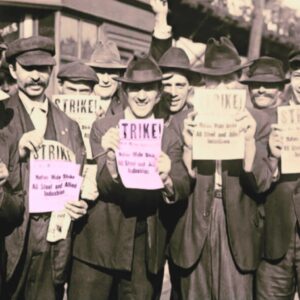
The Book in Ten Quotes: Lucia Berlin
Tell Don't Show: A Manual for Cleaning Women
Every other week Oscar Van Gelderen summarizes a notable new book in ten quotes, with an emphasis on style and voice. No spoilers. This week it’s A Manual For Cleaning Women by Lucia Berlin (Farrar Straus and Giroux).
1.
(Cleaning women: Let them know you are thorough. The first day put all the furniture back wrong… five to ten inches off, or facing the wrong way. When you dust, reverse the Siamese cats, put the creamer to the left of the sugar. Change the toothbrushes all around.)
My masterpiece in this area was when I cleaned the top of Mrs. Burke’s refrigerator. She sees everything, but if I hadn’t left the flashlight on she would have missed the fact that I scoured and re-oiled the waffle iron, mended the geisha girl, and washed the flashlight as well.
Doing everything wrong not only reassures them you are thorough, it gives them a chance to be assertive and a ‘boss’. Most American women are very uncomfortable about having servants. They don’t know what to do while you are there. Mrs. Burke does things like recheck her Christmas card list and iron last year’s wrapping paper. In August.
Try to work for Jews or blacks. You get lunch. But mostly Jewish and black women respect work, the work you do, and also they are not ashamed of spending the entire day doing absolutely nothing. They are paying you, right? (From: “A Manual for Cleaning Women”)
2.
I like working in Emergency—you meet men there, anyway. Real men, heroes. Firemen and jockeys. They’re always coming into emergency rooms. Jockeys have wonderful X-rays. They break bones all the time but just tape themselves up and ride the next race. Their skeletons look like trees, like reconstructed brontosaurs. St. Sebastian’s X-rays.
I get the jockeys because I speak Spanish and most are Mexican. The first jockey I met was Muñoz. God. I undress people all the time and it’s no big deal, takes a few seconds, Muñoz lay there, unconscious, a miniature Aztec god. Because his clothes were so complicated it was as if I were performing an elaborate ritual. Unnerving, because it took so long, like in Mishima where it takes three pages to take off the lady’s kimono. His magenta satin shirt had many buttons along the shoulder and at each tiny wrist; his pants were fastened with intricate lacings, pre-Columbian knots. His boots smelled of manure and sweat, but were soft and dainty as Cinderella’s. He slept on, an enchanted prince. (From: “My Jockey”)
3.
Carlotta woke, during the fourth week of steady October rain, in the County detox ward. I’m in a hospital, she thought, and walked shakily down the hall. There were two men in a large room that would have been sunny if it weren’t raining. The men were ugly, wore black-and-white denim. They were bruised, had bloody bandages. The men are here from a prison but they saw that she was wearing black-and-white denim, that she was bruised and bloody too. She remembered handcuffs, a straitjacket.
It was Halloween. The volunteer AA lady taught them how to make pumpkins. You blow up the balloon, she knots it. Then you stick gooey paper strips all around it. The next night, when your balloon is dry, you paint it orange. The lady cuts out the eyes and the nose and the mouth. You get to choose whether you want a smile or a frown on yours. You don’t get scissors. (From “Her First Detox”)
4.
At first, when a voice on the intercom would say, ‘Nurse! Quick!’ I’d ask, ‘What’s the matter?’ That took too much time; besides, nine times out of ten it’s just that the color’s off the TV.
The only ones I pay attention to are the ones who can’t talk. The light comes on and I push down the button. Silence. Obviously they have something to say. Usually something is the matter, like a full colostomy bag. That’s one of the only other things I know for sure now. People are fascinated by their colostomy bags. Not just the demented or senile patients who actually play with them but everyone who has one is inevitably awed by the visibility of the process. What if our bodies were transparent, like a washing machine window? How wondrous to watch ourselves. Joggers would jog even harder, blood pumping away. Lovers would love more. God damn! Look at that old semen go! Diets would improve—kiwi fruit and strawberries, borscht with sour cream. (From “Temps Perdu”)
5.
Bella Lynn was my cousin, and just about the prettiest girl in West Texas. She had been a drum majorette at El Paso High and Miss Sun Bowl in 1946 and 1947. Later she went to Hollywood to become a starlet. That didn’t work out. The trip started off badly because of her brassiere. It didn’t have falsies in it, but you blew it up, like a balloon. Two balloons.
Uncle Tyler, Aunt Tiny and I went to see her off. In a twin-engine DC-6. None of us had ever been in an airplane before. She said that she was a nervous wreck, but she didn’t look it. She looked just lovely in a pink angora sweater. Her breasts were very big.
The three of us watched her plane, waving at it, until it was way off toward California and Hollywood and then it disappeared. Apparently at about that time it also reached a certain altitude, and because of the pressure in the cabin Bella Lynn’s brassiere blew up. Exploded, I mean. Fortunately, no one in El Paso heard about it. She didn’t even tell me about it for twenty years. But I don’t think that’s why she never became a starlet. (From “Sex Appeal”)
6.
They fed the animals at the same time each day but the rest of the days and nights got turned around. They stayed in bed all day, had breakfast when it got dark, walked in the woods by the light of the moon. They watched Mr. Lucky with Cary Grant at three in the morning. Lazy in the hot sun they rocked in the rowboat on the pond, fishing, reading John Donne, William Blake. They lay in the damp grass, watching the chickens, talking about their childhoods, their children. They watched Nolan Ryan shut out the A’s, slept in sleeping bags by a lake hours away through the brush. They made love in the claw-foot tub, in the rowboat, in the woods, but mostly in the shimmering green of the sun porch when it rained.
What was love? Maria asked herself, watching the clean lines of his face as he slept. What’s to keep the two of us from doing it, loving. (From “Bluebonnes”)
7.
When fresh it looks like caviar, sounds like broken glass, like someone chewing ice.
I’d chew ice when the lemonade was finished, swaying with my grandmother on the porch swing. We gazed down upon the chain gang paving Upson Street. A foreman poured the macadam; the convicts stomped it down with a heavy rhythmic beat. The chains rang; the macadam made the sound of applause.
The three of us said the word often. My mother because she hated where we lived, in squalor, and at least now we could have a macadam street. My grandmother just so wanted things clean—it would hold down the dust. Red Texan dust that blew in with gray tailings from the smelter, sifting into dunes on the polished hall floor, onto her mahogany table.
I used to say macadam out loud, to myself, because it sounded like the name for a friend. (From “Macadam”)
8.
I don’t regret my alcoholism anymore. Before, I left California my youngest son, Joel, came to breakfast. The same son I used to steal from, who had told me I wasn’t his mother. I cooked cheese blintzes; we drank coffee and read the paper, muttering to each other about Ricky Henderson, George Bush. Then he went to work. He kissed me and said So long, Ma. So long, I said.
All over the world mothers are having breakfast with their sons, seeing them off at the door. Can they know the gratitude I felt, standing there, waving? The reprieve. (From “So Long”)
9.
I used to be a switchboard operator in a hospital, spent all day talking to different doctors that I never saw. We all had favorites and ones that we couldn’t stand. None of us had ever seen Dr. Wright but his voice was so smooth and cool we were in love with him. If we had to page him we’d each put a dollar down on the board, would race to answer calls and the one to get his, win the money and say, ‘Hell-oh there, Dr. Wright. ICU is paging you, sir.’ Never did see Dr. Wright in real life but when I got a job working in Emergency I got to know all the other doctors I had talked to on the phone. I soon learned that they were just as we imagined them. The best physicians were the ones who were prompt to answer, clear and polite, the worst were those who used to yell at us and say things like ‘Do they hire the handicapped at the switchboard?’ They were the ones who let the ER see their patients, who had the Medicaid patients sent to County. Amazing how the ones with the sexy voices were just as sexy in real life. But no, I can’t describe how people get the quality into their voice of just waking up or of wanting to go to bed. Check out Tom Hanks’s voice. Forget it. Okay, now Harvey Keitel’s. And if you don’t think Harvey is sexy just close your eyes.
Now I have a really nice voice. I’m a strong woman, mean even, but everyone thinks I’m really gentle because of my voice. I sound young even though I’m seventy years old. Guys at the Pottery Barn flirt with me. ‘Hey. I’ll bet you’re really gonna enjoy lying on this rug.’ Stuff like that.
I’ve been trying to get somebody to lay tiles in my bathroom. People who put ads in the paper for odd jobs, painting, etc., they don’t really want to work. They all are pretty booked up right now or a machine answers with Metallica in the background and they don’t return your call. After six tries B.F. was the only one who said he’d come over. He answered the phone. Yeah, this is B.F., so I said, Hey this is L.B. And he laughed, real slow. (From “B.F. and I”)
10.
Sighs, the rhythms of our heartbeats, contractions of childbirth, orgasms, all flow into time just as pendulum clocks placed next to one another beat in unison. Fireflies in three flash on and off as one. The sun comes up and it goes down. The moon waxes and wanes and usually the morning paper hits the porch at six thirty-five.
Time stops when someone dies. Of course it stops for them, maybe, but for the mourners time runs amok. Death comes too soon. It forgets the tides, the days growing longer and shorter, the moon. It rips up the calendar. You aren’t at your desk or on the subway or fixing dinner for the children. You’re reading People in a surgery waiting room, or shivering outside on a balcony smoking all night long. You stare into space, sitting in your childhood bedroom with the globe on the desk. Persia, the Belgian Congo. The bad part is that when you return to your ordinary life all the routines, the marks of the day, seem like senseless lies. All is suspect, a trick to lull us, rock us back into the placid relentlessness of time. (From “Wait a Minute”)
Oscar Van Gelderen
Oscar van Gelderen (1965) is publisher at Lebowski Publishers, in Amsterdam. He publishes a mix of international and Dutch fiction, has a knack for rediscoveries and loves cult books. He blogs here.



















